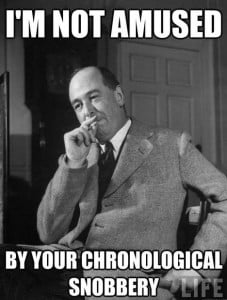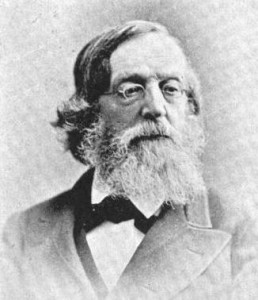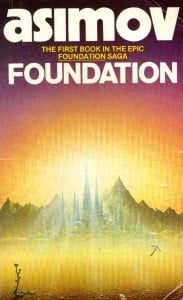 I say, “Yes!” But if we are going to be scientific about theology, it seems to me we need to proceed like scientists, with as few assumptions about the data under observation as possible, i.e. that the Spirit is somehow guiding us. Rather than proceed from that assumption, I would rather wait and see if it emerges from the data. The interplay between theory and observation is inevitable. However, I prefer to be data-driven, because more often than not, our pet theories blind us to the evidence that’s right in front of our face.
I say, “Yes!” But if we are going to be scientific about theology, it seems to me we need to proceed like scientists, with as few assumptions about the data under observation as possible, i.e. that the Spirit is somehow guiding us. Rather than proceed from that assumption, I would rather wait and see if it emerges from the data. The interplay between theory and observation is inevitable. However, I prefer to be data-driven, because more often than not, our pet theories blind us to the evidence that’s right in front of our face.
To that end, I think we need to cultivate what Frank Herbert (Dune) called “the naive mind,” the mind unhindered by preconceptions or prejudice. Theories can be powerful tools, but they are necessarily limiting, b/c they force us to view the data through a single lens. As anyone who understands photography knows, how an object appears varies considerably depending on what kind of lens you use. Lenses with a short focal length bring objects that are close up into focus, but they necessarily make distant objects blurry, and vice versa. Theories function in much the same way. Every theory conceals some things in order to reveal others. So we need to remind ourselves that we always have a lens attached to our “camera,” and, consequently, we are always missing things, either in the foreground, the background or somewhere outside of the frame, even though other objects are in sharp focus.  Therefore, I regard our relationship to theological traditions like this: Every point in history, and every set of political, economic, cultural, linguistic and religious circumstances is like a lens. It makes some things very clear, but it also conceals or blurs others. For example, in light of the Internet, cheap international travel, immigration, and the like, we are currently using a wide-angle lens. As a result, we view our place in the global village quite differently than people like Augustine (who lived in a geocentric universe) or Martin Luther (during whose lifetime America was “discovered”) or even Charles Darwin (who operated from some rather quaint and peculiar notions re: racial differences). Compared to the lens we are using today, these people had a rather narrow view of things, but they also had a deeper depth of field. Thanks in large part to their place in history, these men made some bold and radical discoveries. They were able to observe many things that aren’t so clear to us, b/c we are still grappling with the implications of our current, broader view. Meanwhile, they missed many other aspects of the universe b/c of the limitations of their lenses.
Therefore, I regard our relationship to theological traditions like this: Every point in history, and every set of political, economic, cultural, linguistic and religious circumstances is like a lens. It makes some things very clear, but it also conceals or blurs others. For example, in light of the Internet, cheap international travel, immigration, and the like, we are currently using a wide-angle lens. As a result, we view our place in the global village quite differently than people like Augustine (who lived in a geocentric universe) or Martin Luther (during whose lifetime America was “discovered”) or even Charles Darwin (who operated from some rather quaint and peculiar notions re: racial differences). Compared to the lens we are using today, these people had a rather narrow view of things, but they also had a deeper depth of field. Thanks in large part to their place in history, these men made some bold and radical discoveries. They were able to observe many things that aren’t so clear to us, b/c we are still grappling with the implications of our current, broader view. Meanwhile, they missed many other aspects of the universe b/c of the limitations of their lenses.  With that in mind, I see no reason why we should automatically venerate or reject what these (and thousands of others) observed just b/c it happened a long time ago or relatively recently. After all, chronological snobbery is a two-way street. We should be just as scientific about analyzing their theories and ideas as we are with any other kind of data, the key question being: how well do their ideas accord with our current experience of the world? After all, the universe is what it is no matter our theological or philosophical preferences. Clearly, as I’ve just pointed out, our current circumstances aren’t some sort of universal, objective the benchmark. However, we have a broader range of lenses available to us than our forebears, across which we can correlate huge amounts of data from a variety of perspectives. So I would argue we are actually in a much better position than any generation before us to make determinations re: which theories/ideas best accord with the universe “as it is,” or at least as we currently understand it to be.
With that in mind, I see no reason why we should automatically venerate or reject what these (and thousands of others) observed just b/c it happened a long time ago or relatively recently. After all, chronological snobbery is a two-way street. We should be just as scientific about analyzing their theories and ideas as we are with any other kind of data, the key question being: how well do their ideas accord with our current experience of the world? After all, the universe is what it is no matter our theological or philosophical preferences. Clearly, as I’ve just pointed out, our current circumstances aren’t some sort of universal, objective the benchmark. However, we have a broader range of lenses available to us than our forebears, across which we can correlate huge amounts of data from a variety of perspectives. So I would argue we are actually in a much better position than any generation before us to make determinations re: which theories/ideas best accord with the universe “as it is,” or at least as we currently understand it to be.
Scientific research proceeds through a process of observation, hypothesis, experimentation and reflection on results. Ideally, through this process, conclusions emerge from the data rather than the other way around. Often, these results challenge rather than confirm our preconceptions, preferences and prejudices. This is where such research requires something more than logic and reason. It requires guts. Are we truly willing to follow the evidence wherever it leads, even if that means abandoning our precious theories? This is the difference between a scientific inference and a theological preference. I have all sorts of preferences re: how I would like the universe to be (e.g. I really, really hope God exists and that God is as good as think he is). But as much as it pains me, I am willing to let go of even that idea if it fails to correspond with the data. Like a poker player, if we are truly going to be scientific, I see no other way to do it than to be “all in” on every hand.











